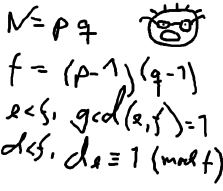poj2635The Embarrassed Cryptographer(同余模+素数筛选+高精度求模)
2017-08-08 10:17
295 查看
The Embarrassed Cryptographer
Description

The young and very promising cryptographer Odd Even has implemented the security module of a large system with thousands of users, which is now in use in his company. The cryptographic keys are
created from the product of two primes, and are believed to be secure because there is no known method for factoring such a product effectively.
What Odd Even did not think of, was that both factors in a key should be large, not just their product. It is now possible that some of the users of the system have weak keys. In a desperate attempt not to be fired, Odd Even secretly goes through all the users
keys, to check if they are strong enough. He uses his very poweful Atari, and is especially careful when checking his boss' key.
Input
The input consists of no more than 20 test cases. Each test case is a line with the integers 4 <= K <= 10100 and 2 <= L <= 106. K is the key itself, a product of two primes. L is the wanted minimum size of the factors in the key. The input
set is terminated by a case where K = 0 and L = 0.
Output
For each number K, if one of its factors are strictly less than the required L, your program should output "BAD p", where p is the smallest factor in K. Otherwise, it should output "GOOD". Cases should be separated by a line-break.
Sample Input
Sample Output
Source
Nordic 2005
题意:求出两素数乘积为k,如果比l大,则输出bad+最小的素数,如果比l小,输出good
10的100次方数够大了,如果每次都以十进制取模素数,那么肯定超时,因此高精度求模,换成千进制,算式为:
r=(r*1000+kt[i])%q;,其中r为进位,kt[i]为原十进制位值,q为取模数
代码
然后就是素数打表,这里要求打出1e6的素数,注意是素数值最大要超过1e6
不用素数筛选也可以~
然后就是进制转换了,十进制转千进制,在这里倒序更好下一步处理:
代码:
| Time Limit: 2000MS | Memory Limit: 65536K | |
| Total Submissions: 14852 | Accepted: 4071 |

The young and very promising cryptographer Odd Even has implemented the security module of a large system with thousands of users, which is now in use in his company. The cryptographic keys are
created from the product of two primes, and are believed to be secure because there is no known method for factoring such a product effectively.
What Odd Even did not think of, was that both factors in a key should be large, not just their product. It is now possible that some of the users of the system have weak keys. In a desperate attempt not to be fired, Odd Even secretly goes through all the users
keys, to check if they are strong enough. He uses his very poweful Atari, and is especially careful when checking his boss' key.
Input
The input consists of no more than 20 test cases. Each test case is a line with the integers 4 <= K <= 10100 and 2 <= L <= 106. K is the key itself, a product of two primes. L is the wanted minimum size of the factors in the key. The input
set is terminated by a case where K = 0 and L = 0.
Output
For each number K, if one of its factors are strictly less than the required L, your program should output "BAD p", where p is the smallest factor in K. Otherwise, it should output "GOOD". Cases should be separated by a line-break.
Sample Input
143 10 143 20 667 20 667 30 2573 30 2573 40 0 0
Sample Output
GOOD BAD 11 GOOD BAD 23 GOOD BAD 31
Source
Nordic 2005
题意:求出两素数乘积为k,如果比l大,则输出bad+最小的素数,如果比l小,输出good
10的100次方数够大了,如果每次都以十进制取模素数,那么肯定超时,因此高精度求模,换成千进制,算式为:
r=(r*1000+kt[i])%q;,其中r为进位,kt[i]为原十进制位值,q为取模数
代码
int r=0;
for(int i=len-1; i>=0; i--)
{
r=(r*1000+kt[i])%q;
}然后就是素数打表,这里要求打出1e6的素数,注意是素数值最大要超过1e6
不用素数筛选也可以~
int get_prim()
{
int cnt=0;
prime[cnt++]=2;
for(int i=3; i<=N; i+=2) //奇偶法
{
bool flag=true;
for(int j=0; prime[j]*prime[j]<=i; j++) //根号法+递归法
if(!(i%prime[j]))
{
flag=false;
break;
}
if(flag)
prime[cnt++]=i;
}
}筛选法:int get_prim()
{
int cnt=0;
prime[cnt++]=2;
for(int i=3; i<=N; i+=2) //奇偶法
{
bool flag=true;if(!vist[i])
for(int j=i+i; j<=N; j+=i) //根号法+递归法 vist[j]=0; if(vist[i]) prime[cnt++]=i; } }
然后就是进制转换了,十进制转千进制,在这里倒序更好下一步处理:
int get_kt(char *K,int lenK)
{
for(int i=0;i<lenK;i++) //把K转换为千进制Kt,其中Kt局部顺序,全局倒序
{ //如K=1234567=[ 1][234][567] ,则Kt=[567][234][1 ]
int pKt=(lenK+2-i)/3-1;
kt[pKt]=kt[pKt]*10+(K[i]-'0');
}
}代码:
#include <cstdio>
#include <cstring>
#include <algorithm>
#include <vector>
#include <queue>
#include <iostream>
using namespace std;
#define N 1000100
int prime
;
int kt[11000];
int get_prim() { int cnt=0; prime[cnt++]=2; for(int i=3; i<=N; i+=2) //奇偶法 { bool flag=true; for(int j=0; prime[j]*prime[j]<=i; j++) //根号法+递归法 if(!(i%prime[j])) { flag=false; break; } if(flag) prime[cnt++]=i; } }
int get_kt(char *K,int lenK) { for(int i=0;i<lenK;i++) //把K转换为千进制Kt,其中Kt局部顺序,全局倒序 { //如K=1234567=[ 1][234][567] ,则Kt=[567][234][1 ] int pKt=(lenK+2-i)/3-1; kt[pKt]=kt[pKt]*10+(K[i]-'0'); } }
int get_mod(int q,int len)
{
int r=0; for(int i=len-1; i>=0; i--) { r=(r*1000+kt[i])%q; }
if(!r)
return 0;///整除
return 1;
}
int main()
{
get_prim();
int L;
char K[10000];
while(cin>>K>>L && L)
{
memset(kt,0,sizeof(kt));
int len=strlen(K);
get_kt(K,len);
int len1=(len+2)/3;
/*for(int i=0;i<len;i++)
{
cout<<"--->"<<kt[i]<<endl;
}*/
int flag=1;
int pMin=0;
while(prime[pMin]<L)
{
if(!get_mod(prime[pMin],len1))
{
flag=0;
cout<<"BAD "<<prime[pMin]<<endl;
break;
}
pMin++;
}
if(flag)
cout<<"GOOD"<<endl;
}
return 0;
}
相关文章推荐
- POJ2635——The Embarrassed Cryptographer(高精度取模+筛选取素数)
- POJ 2635 The Embarrassed Cryptographer (大整数求模/高精度求模 + 同余模定理 +素数打表)
- (POJ2635)The Embarrassed Cryptographer <高精度求模(千进制表示) + 同余模定理 + 素数打表>
- UVa 11426 GCD - Extreme (II) / 素数筛选 + 欧拉函数
- 【Python】Python_learning10_2:Python中的素数筛选(方法二)
- 素数筛选法
- 线性筛选素数
- 素数筛选再优化模板
- 素数筛选法。
- HDU2303(数论)大整数求余+素数筛选
- 素数筛选法
- [day 2]判断素数_筛选法2014.7.14
- 素数 筛选获取
- 线性筛选求素数
- hdu 5407 CRB and Candies(素数筛选法,除法取模(乘法逆元))
- HDU 2710 Max Factor【素数筛选】
- poj2262 筛选法求素数
- 筛选法求素数
- 【慢慢学算法】:求较大素数 筛选法
- 51nod 1536不一样的猜数游戏 思路:O(n)素数筛选法。同Codeforces 576A Vasya and Petya's Game。
